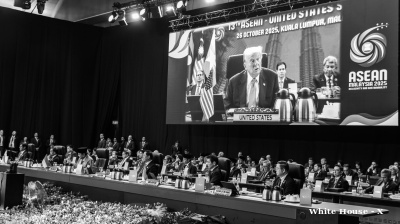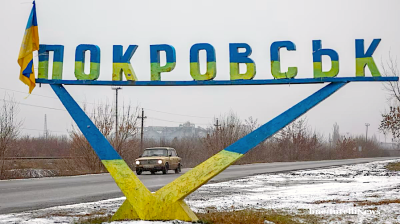Three of four Tajik nationals accused of carrying out the March 2024 terror attack—in which more than 140 people died at the Crocus City Hall concert venue in outer Moscow—on August 4 pled guilty on the first day of their trial. The fourth defendant entered a plea of partly guilty.
Also standing trial at the Second Western District Military Court are 15 alleged accomplices.
The pre-trial hearings of the men accused of being the gunmen who conducted the assault, which took place two days after the attack, were remarkable in that the suspects were presented to the court in a state that quite clearly showed that they had been tortured, and the Kremlin appeared not in the least concerned by that fact. One appeared to have had an ear cut off.
The three perpetrators who admitted guilt before a three-judge panel are Dalerdzhon Mirzoyev, Shamsidin Fariduni and Muhammadsobir Faizov. The suspect who pleaded partly guilty is Saidakram Rachabalizoda.
In the attack, gunmen opened fire before setting the building alight.
The 15 alleged accomplices, including Kyrgyz nationals, face charges of assisting, training, organising and participating in the attack. As well as the high death toll, the atrocity left as many as 550 injured. It was the worst terrorist attack suffered by Russia since the 2004 Beslan school siege in which 333 people, many of them children, lost their lives.
Afghanistan-based Islamic State-Khorasan (ISKP, or ISIS-K), which recruits Central Asians, claimed responsibility for the attack. Moscow has acknowledged the Islamist nature of the attack but, without evidence, has claimed it was carried out in the interests of Ukraine.
In the weeks before the assault on Crocus City Hall, Western intelligence agencies had privately and publicly warned Moscow that they had learned of “imminent plans to target large gatherings” in the Russian capital. However, just three days before the attack, Russian leader Vladimir Putin dismissed the warnings. He claimed that they were “an attempt to scare and intimidate our society”.
At the court, the prosecution applied for the proceedings to be held behind closed doors at points where evidence is discussed. The judges granted the request.
About 30 survivors of the attack were reportedly present at the court.
"In normal democratic countries, this would never happen – confessions were beaten out of people accused of a terrorist attack and they [the authorities] don't even hide it," human rights activist Karimjon Yorov told RFE/RL's Russian service, which is banned in Russia.
Russia has also come under fire from rights organisations for a wave of xenophobia, and tightened regulations targeted at Central Asian migrant workers in the country since the attack.
Russia is heavily reliant on migrant labour. There are around 3.3mn workers from Central Asia working in Russia.
In September, officials will launch a migrant monitoring system that will include biometric registration, location tracking (migrants will be ordered to download an app enabling the tracking to their phones) and intensified police oversight.
News

Trump pledges enduring support for Southeast Asia as new trade deals signed
During his visit to Southeast Asia, US President Donald Trump declared that Washington would remain a steadfast ally to the region, as he signed a series of trade agreements with four ASEAN member states.

US grants 0% tariffs to Malaysia alongside Cambodia and Thailand
US President Donald Trump has approved a 0% tariff scheme for selected goods from Malaysia, Cambodia, and Thailand, a move formalised during the ASEAN Summit in Kuala Lumpur.

Russia test fires its Burevestnik nuclear-powered cruise missile
Russia’s Burevestnik nuclear-powered cruise missile has no analogues in the world, Russian President Vladimir Putin said, as the Kremlin escalates the unfolding missile arms race with Ukraine another notch.

Russia claims to surround Pokrovsk
Russia’s chief of the general staff Valery Gerasimov triumphantly reported to Putin that 31 Ukrainian battalions have been encircled in Pokrovsk and 18 battalions in Kupyansk, the hottest spot in the war.
.jpg)



